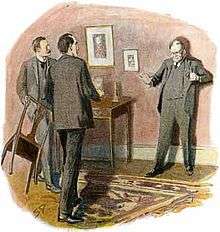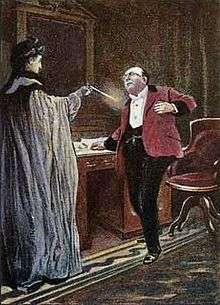The Adventure of Charles Augustus Milverton
| "The Adventure of Charles Augustus Milverton" | |
|---|---|
|
Charles Augustus Milverton, 1904 illustration by Sidney Paget | |
| Author | Arthur Conan Doyle |
| Series | The Return of Sherlock Holmes |
| Publication date | 1904 |
"The Adventure of Charles Augustus Milverton" is one of the 56 Sherlock Holmes short stories written by British author Sir Arthur Conan Doyle. It is one of 13 stories in the cycle collected as The Return of Sherlock Holmes and was published in 1904.
Timeline
According to William S. Baring-Gould's timeline of the Sherlock Holmes canon, the events of "Milverton" occurred in 1899.[1] This was nine years after the strange death of Charles Augustus Howell, the real-life inspiration for the character of Milverton (see below).
Plot

Holmes is hired by the débutante Lady Eva Blackwell to retrieve compromising letters from a blackmailer: Milverton, who causes Holmes more revulsion than any of the 50-odd murderers in his career. Milverton is "the king of blackmailers" and he makes his living out of blackmail. He demands £7,000 (over £800,000 in 2015) for the letters, which would cause a scandal that would end Lady Eva's marriage engagement. Holmes offers £2,000, all Lady Eva can pay, but Milverton insists on £7,000. It is worth £7,000 to him to make an example of Lady Eva, ensuring his future blackmail victims would be more "open to reason" and pay him what he wants knowing he will destroy them if they don't. Holmes resolves to recover the letters by whatever means necessary, as Milverton has placed himself outside the bounds of morality.
Holmes visits Milverton's Hampstead house, disguised as a plumber, in order to learn the plan of the house and Milverton's daily routine. He cultivates the acquaintance of Milverton's housemaid and even becomes engaged to marry her. This rather shocks Watson, but Holmes assures him that he has a hated rival who will step in when the plumber disappears. Holmes has learned where Milverton keeps his blackmail papers (a safe in his study), and plans to burgle Milverton's house that night. Watson comes along.
They break into the study, and Holmes opens the safe. But just then Milverton, who should be in bed asleep, enters the study. Holmes and Watson hide behind a curtain, while Milverton has a midnight meeting with a supposed maidservant offering to sell letters that would compromise her mistress.

The woman is actually one of Milverton's former victims, whose broken-hearted husband died when she wouldn't pay Milverton and he revealed her secret. Now she avenges her husband by shooting Milverton to death, then stamps on his face.
Watson instinctively begins to rush out and stop the shooting, but Holmes restrains him. Holmes understands, and Watson instantly realises, "that it was no affair of ours; that justice had overtaken a villain..." The woman runs away, and Milverton's household is roused by the shots. But Holmes takes the time to dump all of Milverton's blackmail papers on the fire in the fireplace, despite the risk of being discovered and caught.
Then Holmes and Watson escape through the garden and over the wall. Watson has to kick himself free from a pursuer who has grabbed his leg.
The next morning, Inspector Lestrade calls at Baker Street to ask for Holmes' help in investigating Milverton's murder, which he ascribes to the two burglars seen escaping over the garden wall. He has a description of one of them: "a middle-aged, strongly built man-square jaw, thick neck, moustache..." Holmes calls that vague. "Why, it might be a description of Watson!" he says, which amuses Lestrade. But Holmes refuses Lestrade's request: "my sympathies are with the criminals, and I will not handle the case."
Later, Holmes recognises the face of the woman who killed Milverton. He shows Watson her photograph displayed in a shop-window among those of other celebrities. Watson recognises the name of her famous husband, but Holmes signals silence with a finger to his lips.
Adaptations
The story was faithfully adapted in the 1965 BBC series Sherlock Holmes with Douglas Wilmer as Holmes, and Barry Jones as Milverton. The only difference from the story is the identity of Milverton's killer.
The Soviet TV series The Adventures of Sherlock Holmes and Dr. Watson featured the case under the name "The King of Blackmail". It was the first of the three episodes concerning Professor Moriarty. Apparently, Milverton was a member of the gang, since certain papers were recovered from his office which helped implicate the Professor. Also, the lady who killed him, as well as her husband, are given names in the series, and Holmes approaches the lady to obtain the papers which she took with her. Otherwise, it is quite faithful to the original.
The story was much extrapolated when adapted by screenwriter Jeremy Paul for Granada Television series Sherlock Holmes starring Jeremy Brett. It became the 1992 feature-length episode The Master Blackmailer and featured Robert Hardy as the eponymous reptilian Milverton. Holmes's relationship with the maid is expanded upon, allowing Brett to suggest Holmes' buried tenderness and inability/unwillingness to indulge in matters of the heart. The violence of the villain's end, including the grisly grinding of the avenger's heel into the dead Milverton's bespectacled face, is faithfully adapted, but Holmes and Watson do not at the end gaze upon Milverton's killer's portrait, as the murderess is identified. Deviating from the original story, Holmes holds a very different opinion about the case's end. He requests Watson not to chronicle the case, deeming it to have unpleasant circumstances, whereas in the original story he's slightly more cheerful, as shown by his joking to Lestrade.
The 1945 film The Woman in Green with Basil Rathbone and Nigel Bruce is a loose adaptation of this story. Milverton is replaced by Moriarty.
The "Dead Man's Switch" episode of the CBS crime drama Elementary loosely adapts the story, with Milverton as a professional blackmailer who contacts his "clients"and prevents his own exposure by informing them that he has an accomplice who will distribute the damaging material if Milverton is arrested.[2] Milverton is brought to Holmes's attention when he blackmails the family of a rape victim, the family being known to Holmes's addiction sponsor. The case is complicated when Holmes witnesses Milverton's murder while infiltrating his house. Holmes is compelled to locate Milverton's accomplice, who has access to all of Milverton's material and instructions to post it on the Internet if Milverton is caught or killed.
The third season of the BBC adaptation Sherlock features 'Charles Augustus Magnussen', portrayed by Lars Mikkelsen, as a primary antagonist. The episode "His Last Vow" aired 12 January 2014. In it, it is revealed that Charles Magnussen keeps the information with which he blackmails his victims in his own mind palace (inside his head), only occasionally acquiring hard copies when he has to. Despite Mycroft warning Sherlock to leave Magnussen alone as he is occasionally useful to the government, he is shot dead by Sherlock in order to free John from his power and guarantee Mary's safety, as Sherlock realizes by using his mind palace he has no actual evidence in the event of his death.
The episode "The Adventure of the Portrait of a Teacher" in the NHK puppetry Sherlock Holmes is loosely based on the story. In it, a portrait of history teacher Charles Augustus Milverton that Beppo draws in class is taken away by himself. Milverton is said to be the severest with pupils in Beeton School and Beppo requests Holmes to take it back. Holmes and Watson steal into the teacher's room where they see a female pupil Agatha, who is tutored by Milverton privately because she is too nervous to attend class with other pupils. She tells them that he is kind and in fact they find Milverton, who goes back to his room shows an unexpected side.
The real master blackmailer: Charles Augustus Howell
The character of Charles Augustus Milverton was based on a real blackmailer, Charles Augustus Howell. He was an art dealer who preyed upon an unknown number of people, including the artist Dante Gabriel Rossetti.[3]
Doyle's literary inspiration often came from his natural interest in crime, and he had no tolerance for predators. Howell died in 1890 in circumstances as strange as any of Doyle's novels: His body was found near a Chelsea public house with his throat posthumously slit, with a half-Sovereign coin in his mouth. The presence of the coin was known to be a criticism of those guilty of slander.[3]
Literary inspirations
- In Donald Thomas's collection of short stories, The Secret Cases of Sherlock Holmes, Watson "admits" that Milverton was, in fact, an alias used for the real Charles Augustus Howell.
- The story also serves as the basis for Thomas's short story in the collection of the same name, "The Execution of Sherlock Holmes", in which Milverton's brother Henry (and several other relatives of Holmes's past adversaries) kidnap Holmes and stage a kangaroo court, putting Holmes "on trial" for the murder of Milverton.
- In Gerald Lientz's gamebook Death at Appledore Towers (Sherlock Holmes Solo Mysteries number 3) Watson's cousin, a protégé of Holmes, investigates Milverton's murder after Holmes has refused to do so.
References
- ↑ Redmond, Chris (2000). Sherlockian.Net: William S. Baring-Gould. Retrieved from http://www.sherlockian.net/societies/baringgould.html.
- ↑ http://www.spoilertv.com/2013/04/elementary-episode-120-dead-mans-switch.html
- 1 2 Basbanes, Nicholas A. (1999-03-15). A Gentle Madness: Bibliophiles, Bibliomanes, and the Eternal Passion for Books Holt Paperbacks, 15 March 1999, ISBN 978-0-8050-6176-5, pp 15-16.
Bibliography
- Basbanes, Nicholas A. (1999-03-15). A Gentle Madness: Bibliophiles, Bibliomanes, and the Eternal Passion for Books Holt Paperbacks, 15 March 1999, ISBN 978-0-8050-6176-5.
- Angeli, Helen (1971). Pre-Raphaelite twilight: The story of Charles Augustus Howell Scholarly Press, 1971, ISBN 978-0-403-01312-8.
External links
 The full text of The Adventure of Charles Augustus Milverton at Wikisource
The full text of The Adventure of Charles Augustus Milverton at Wikisource Media related to The Adventure of Charles Augustus Milverton at Wikimedia Commons
Media related to The Adventure of Charles Augustus Milverton at Wikimedia Commons-
 The Adventure of Charles Augustus Milverton public domain audiobook at LibriVox
The Adventure of Charles Augustus Milverton public domain audiobook at LibriVox
